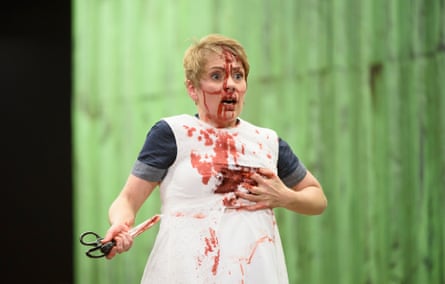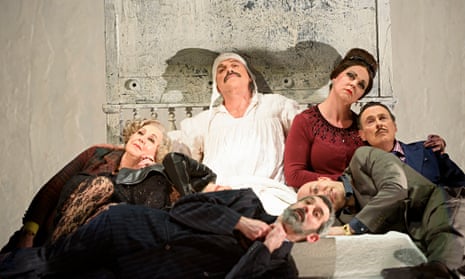Money talks, love is fickle, life is short. These brutish dictums apply equally to Manuel de Falla’s fatalistic La vida breve and to Puccini’s glittering comedy Gianni Schicchi, premiered a few years apart just before and after the first world war. The first is a young man’s outpouring, the second a summation of mature genius. Opera North, in a season marked by imaginative contrasts, has paired these works in an engrossing new double bill directed by Christopher Alden and conducted by Jac van Steen, which opened in Leeds last week.
In each case the music is immediate and beguiling. Performances are strong and in some cases outstanding. Chorus and orchestra excel. Each opera, by a largely different design team but both lit by Adam Silverman, looks stylish with echoes of Spanish-Italian cinema – La vida breve full of cruel, Almodóvar beauty, Gianni Schicchi a sharp cocktail of retro 1960s beehives and stilettos updated to the laptop age, with a peppering of 14th-century Florentine ornament.
First performed in Nice in 1913, La vida breve all but staggers under the weight of Spanish angst. As befits the composer of Nights in the Gardens of Spain or the ballet El amor brujo, the writing is vivid and descriptive, complete with guitar, castanets, flamenco dance and Andalucian folk influence in the vocal writing. The librettist, Guillermo Fernández-Shaw, was a zarzuela poet, but that mix of speech and popular song is absent here, where the orchestral writing takes pride of place.
The plot is brief and visceral. A Gypsy girl, Salud, falls for Paco, who leads her on but is engaged to a girl of his own class and wealth. At their wedding, Salud falls dead at the couple’s feet. Alden’s production was first seen in 2004 as one of Opera North’s Eight Little Greats, designed by the late Johan Engels. (The double bill is dedicated to him, and to Gordon Linacre, the press baron and a founding father of Opera North who died earlier this month.)
A repeated metaphor, sung in an opening lament, is that mankind suffers in life as an anvil from the blows of hammers. No cheer here. Alden and Engels have set the action in a different kind of furnace: an oppressive sweatshop where impassive women treadle away their lives sewing bridal gowns for the rich. Ghostly ivory dresses hang in dubious symbolic purity, presaging the work’s blood-spattered end.

Falla, whose Catholicism grew fervent later in life, for a while tried to suppress theatre performances of his stage works and ballets. He knew their potential to shock. Alden obliges with an unblinking, terrifying array of sexual violence and transgression, performed by a cast who can cope: Anne Sophie Duprels, an Opera North favourite, gamine and urgent as Salud, makes up for any lightness of voice with the intensity and fervour of her performance. Jesús Alvarez is a shiny, handsome Paco. Elizabeth Sikora (Grandmother), Daniel Norman (Worker), Brian Bannatyne-Scott (Uncle Salvador) and Quirijn de Lang (Flamenco crooner) all make the most of their slender characters.
Several of the cast reappear in the large ensemble required for Gianni Schicchi, an appropriately crazy new production designed by Charles Edwards of Puccini’s only comedy, one third of his Il trittico. The premiere, at the Metropolitan Opera in New York in 1918, was the last the composer attended of his own work (Turandot was unfinished when he died in 1924). This staging plunders the opera’s absurdist qualities to witty and triumphant end.
The story is spun from a disgruntled line or two in Canto XXX of Dante’s Inferno. Old moneybags Buoso Donati is dying. His rapacious mourners can hardy wait. Puccini’s score is nowhere more devilish than in the opening sighs of false grief. At the start, the bookish young lover Rinuccio sits reading La Divina Commedia when in strides the poet himself, wearing hallmark red cowl and laurel corona, as per Botticelli or Raphael. In an instant, this Pythonesque Dante has jumped into bed and become Donati, resisting his own demise with acrobatic invention. The versatile director of movement for both operas, Tim Claydon, plays Dante/Donati.
The family’s folly is to call on the help of that great Florentine wide-boy trickster Gianni Schicchi, dazzlingly played by Christopher Purves with more hip swivels, lip curls and soft-shoe charm than seems healthy. He fools them all. Purves’s sense of comic timing is impeccable, and he gamely takes his trousers down when asked. The entire ensemble shines, from Sikora’s fussing Zita to Victoria Sharp’s white-blond, leather-and-lace Nella (eat your heart out, Donatella Versace) to Jennifer France’s baby-doll Lauretta. Her O mio babbino caro, which quite literally floored her father, Schicchi, hit the spot.
Oblivious throughout, a small schoolboy in short trousers (Rhys Gannon, 11, as Gherardino) jigs arrhythmically to whatever is thumping in his orange headphones, evidently not Puccini’s score. “Laugh because soon you will cry,” runs a bleak line in La vida breve. That’s a good enough reason to see this bravura double bill.

Comments (…)
Sign in or create your Guardian account to join the discussion